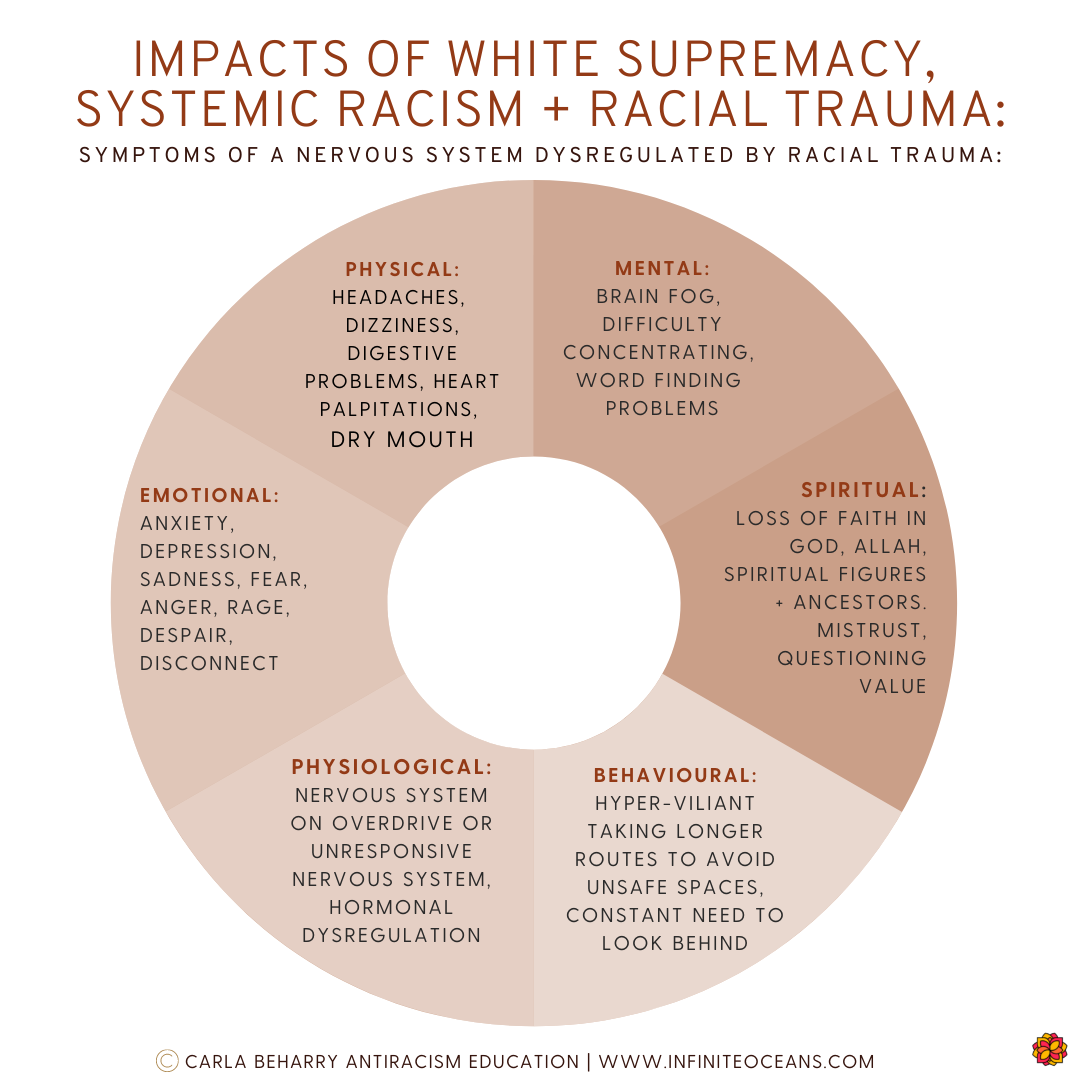Embodied Racial Justice + Health Equity Workshops and Trainings
Engaging, interactive, experiential, somatically-focused, culturally-intentional, and trauma-responsive sessions for small and large groups.
Discrimination based on race, religion, ethnicity, gender identity, sexual orientation, disability, age, class, and mental health status is experienced daily in community spaces and workplaces, resulting in mental, emotional, and physical trauma that is pervasive, persistent, chronic and unpredictable for bodies who do not fit into the dominant narrative of cisgender, heterosexual, able-bodied, whiteness.
“We worked closely with Carla to provide a series of 7 workshops to our team of ~75 people over the course of 4 months.
The experience has been transformative and significantly positive. We had a strong idea of the learning objectives we wanted to meet, and Carla worked closely with our team to ensure that they were met and exceeded.
Carla’s somatic and trauma-responsive approach was a revelation for our team, and we believe this approach, combined with her engaging teaching and leadership style, has ensured that the lessons learned are still resonating.
More than 6 months after our work with Carla we are working on substantive changes to our working practice and we know that this work will be well positioned because of our training. She was incredibly responsive throughout our work together, asking nuanced questions about our working culture, demographics and needs, listening to our questions and adjusting her content and approach accordingly. She provided resources and created a place where individuals felt comfortable asking questions.
Carla brought in guest speakers within her workshops to ensure a diversity of lived experiences were present to share teaching, and tailored her approach to the service needs of our industry. We cannot recommend working with Carla enough. ”
“Digesting the content of our workshop with Carla has been a highly personal, challenging, and still very much on-going experience for our group. In just one day, though, Carla presented us with actionable tasks that could be implemented right away as well as a clear, meaningful path for our organization to take on our way to becoming the anti-racist, anti-oppressive organization we aspire to be. Still lots of work to be done but I’m hopeful that we’re heading in the right direction!”
sessions are:
EMBODIED / SOMATIC: Designed to move beyond cognitive-learning to encourage all team members to explore ways in which white-bodies hold power in interactions, and how your team can collectively use their bodies to shift power dynamics to centre Black, Indigenous, racialized, Trans, Queer, disabled, and oppressed bodies.
ENGAGING / INTERACTIVE: Presented through a social justice framework, sessions shift away from colonial educational models that centre “one instructor”. In these sessions, “everyone teaches and everyone learns”. Depending on the size of your team, sessions include social justice exercises, breakout rooms, full-group discussions, small group discussions, visual and audio displays. Efforts are made to accomodate all learning styles.
ROOTED IN BUILDING ACCOUTABLE + SAF(ER) SPACES: In full workshop series, group members have an opportunity to contribute to defining group norms, values and expectations for behaviour, so all members are accountable to upholding the transformative and restorative nature of the space.
All individuals taking part in small or large group sessions will be asked to read and agree to my Accountable + Saf(er) Spaces Policy to ensure we maintain a space that is protected for oppressed bodies. The full saf(er) spaces policy can be viewed here:
session topics include:
Understanding dynamics of power and privilege. Recognizing whose bodies carry power and how this impacts workplace dynamics
Learning about systems of oppression and racism, and how these systems determine who gains access to education, healthcare and workplace advancement.
Exploring race-based trauma and white (body) supremacy as somatic and body-based experiences.
Understanding community-care models that prioritize wellness and connection of the community along with individual definitions of wellness.
Developing appropriate and empowering language that centres the experience of racialized clients
Understanding racial constructs, white advantage and the differences between the system white supremacy that we live within vs. white supremacist violence, so as to understand systems of oppression that benefit some and harm others.
Dismantling pervasive mentalities that centre whiteness and cis-gender individuals as the “norm” and racialized individuals as “different”
Undoing the desire to “not see colour” or to stay silent - How to advocate for mental health and physical health services for under-served clients
Becoming an advocate and co-conspirator in movements for health and education equity
Understanding the difference between being “antiracist” vs. “not racist”
Exploring subtle and overt prejudice and they ways in ways in which practitioner bias creates barriers to care for racialized clients.
Learning how to create culturally-informed intake forms.
Learning how to ask culturally-informed questions about how your client’s ethnicity, culture, religion or philosophy impact their priorities for mental and emotional wellness (understanding spiritual beliefs).
Exploring ancestral and inter-generational trauma as important components to mental, emotional, physical, and spiritual well-being.
Understanding barriers to care that exist at the systemic level, the community level, the practitioner level, and the personal level.
How does racial and oppression-based trauma appear in clients?
Racial and oppression-based trauma are not “cognitive” experiences. Therefore, the dismantling of discriminatory and oppressive mindsets, behaviours and practices must go beyond cognitive learning.
Racism and discrimination are complex, chronic, consistent and compounded experiences that impact the mental, emotional, physical, spiritual, physiological, psychological and behavioural well-being of the receiver.
Our work is to end the dehumanization carried by oppressed bodies, to collectively shift to humanization for all people.
What happens to nervous systems, continuously subjected to unpredictable racial trauma?
Our bodies are designed to respond to acute and situational moments of stress or impact. Our bodies are not designed to function optimally through chronic and sustained racism and discrimination.
Racism and discrimination are unpredictable. Racial trauma can be a first-hand experience or symptoms can be vicarious and secondary, appearing after witnessing the violence, murders, tortures and genocides of Black and brown bodies.
Nervous systems that become dysregulated through racial trauma cannot permanently regulate in a society that is not permanently safe.
“I highly recommend Carla’s antiracism/anti-oppression workshop for wellness pros. Her passion, warmth and sharing of her lived experiences helped to create a safe, supportive space for us to learn/unlearn, address our biases, and ask questions without judgement. The workshops were well organized and easy to follow and provided me with a framework to make lasting changes. I had some real A-HA moments that will change how I interact with racialized folks. So glad I signed up!”
“Thank you so much for all of this, Carla.
Your focus on body and somatic practices was much appreciated. I appreciated your focus on family and connecting with our students - I feel our public education needs to spend more time focusing on making connections with our students’ families; too often they are only contacted when there is a problem or concern and the contact is often very cold. Most importantly, I want to thank you for connecting educators and being so candid with your information and experiences. We need community members like you advocating and educating, as exhausting as this must be. I am hoping that I can continue to connect with not only others in education, but community members who are doing this difficult work”
“Thank you for a remarkable workshop. To have found a workshop that focused on wellness practitioners was invaluable, I’m grateful you found and filled this niche. I found your curriculum rich from your experience and perspective, and your presentation is clear, and warm.”
“Carla’s course has encouraged me to engage more consciously with privilege, implicit bias and embodied awareness. She creates brave spaces to do antiracism and oppression work and her wisdom has undoubtedly impacted myself and others for the better.”
“Carla is brilliant and I’m so happy I took this course. It is the perfect balance of practical/resourceful and personally transformative. I have learned so much and feel better equipped to make my practice accessible and inclusive for all kinds of folks in my community. Carla holds a compassionate and inviting space and I feel so grateful to have been able to learn from her. If you are considering taking this course, I highly recommend that you do!”
organizations i’ve worked with:
Lutherwood | Waterloo
Pedorthic Association of Canada
RBC Ventures
Sanguen Health Centre | Waterloo
Stratford Local Community Food Centre
The Toronto Apothecary
Three Tides Wellness | Waterloo
University of Waterloo AccessAbility Office
University of Waterloo Science Society
University of Waterloo Student Success Office
Waterloo Wellington Knowledge Exchange
Waterloo Catholic District School Board Specialist High Skills Major Program
Waterloo Region District School Board
Waterloo Region Association of Realtors
Waterloo Region Suicide Prevention Council
Women in Educational Leadership | Waterloo
Woolwich Counselling Centre
YMCA of Three Rivers Employment Services
A+ Creative Inc. | Toronto
Bereaved Families of Ontario | Midwestern Region
Blu Matter Project | Toronto
Canadian Mental Health Association of Waterloo Wellington
Centre for Popular Democracy | New York
CISV International
Centre for Mindfulness Studies | Toronto
Conestoga College | Kitchener
Extend-A-Family | Waterloo
Family Counselling Centre of Cambridge and North Dumfries
Happy Explorers Childcare Centre | New Hamburg
Hillside Music Festival | Guelph
HOBY Youth Leadership Canada
Hotel Dieu-Grace Healthcare Youth Advisory Council
Interfaith Counselling Centre | New Hamburg
Intrigue Media | Guelph
John F. Ross CVI | Guelph
Justisse College International
“The Anti-Racism for Wellness Professionals Workshop with Carla Beharry was the first real step I took in becoming anti-racist. I found her approach safe and welcoming but also straightforward and honest. Her knowledge was a powerful testament to the work she has done both personally and professionally. She also created a safe community space for all of us in the course to share and be vulnerable around our feelings, questions and known and unknown biases. I appreciate Carla and the work she is doing to help educate us wellness professionals to become anti-racist and better ally’s moving forward.”
“This course is an absolute must for educators who want to begin/continue their journey in anti-racism and anti-oppression work. Carla included an incredible amount of information and guidance in the four sessions that allowed me to grow in my understanding of bias, racism trauma, and the importance of decolonizing the classroom. She uses her knowledge and expertise as a yoga instructor to lead students of the course through nervous-system based exercises to rewire and relearn the way we approach our racialized students. Carla encouraged thoughtful discussions that allowed for reflection, growth, and development of ourselves as educators all while providing informative feedback that is necessary for our anti-racism work”
“Thank you for a remarkable workshop. To have found a workshop that focused on wellness practitioners was invaluable, I’m grateful you found and filled this niche. I found your curriculum rich from your experience and perspective, and your presentation is clear, and warm.”



